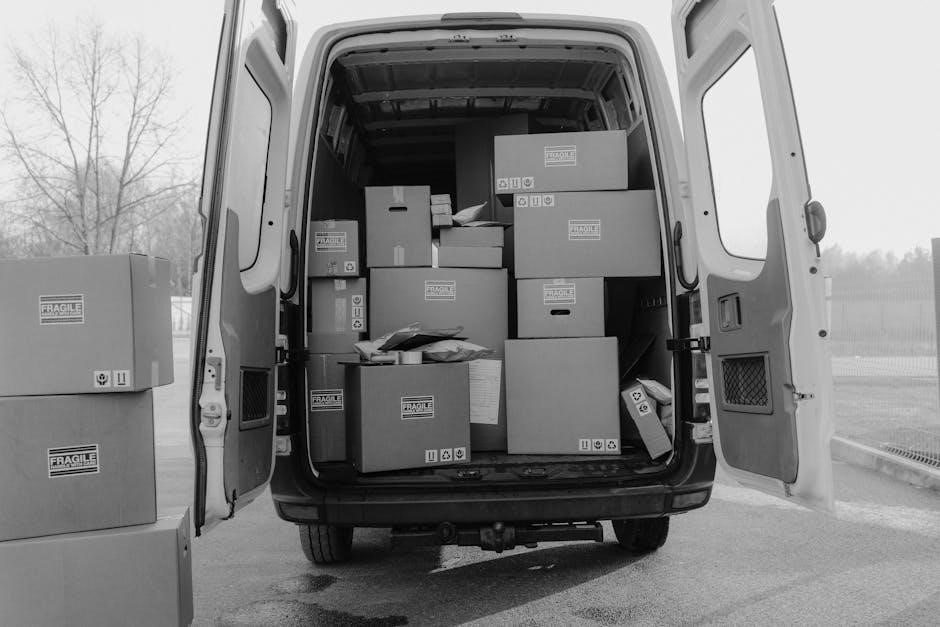Cabover truck camper plans offer a cost-effective, customizable way to build a camper that fits over your truck’s cab, maximizing space and aerodynamics for outdoor adventures.
What Are Cabover Truck Campers?
Cabover truck campers are compact living units designed to be mounted on pickup truck beds, extending over the truck’s cab. They provide a self-contained space for sleeping, cooking, and storage, making them ideal for camping and off-grid adventures. These campers are typically lightweight and aerodynamic, ensuring better fuel efficiency and ease of towing. Unlike larger RVs, cabover campers are more maneuverable and can access remote areas. They often feature basic amenities like a bed, kitchenette, and bathroom, offering a cozy retreat for travelers. Their design allows for easy installation and detachment, making them a practical choice for outdoor enthusiasts seeking flexibility and convenience.
Benefits of Cabover Truck Campers
Cabover truck campers offer numerous advantages for outdoor enthusiasts. Their compact size and lightweight design improve fuel efficiency, reducing costs and environmental impact. These campers are highly maneuverable, allowing access to remote areas that larger RVs cannot reach. They provide a cozy, self-contained living space with essential amenities, making them ideal for off-grid adventures. Additionally, cabover campers are more affordable than traditional motorhomes, offering a cost-effective solution for camping. Their simplicity and ease of use make them a favorite among travelers seeking flexibility and convenience. Whether for weekend getaways or extended trips, cabover truck campers deliver a practical and enjoyable experience, combining portability with comfort. They also offer a sense of independence, enabling adventurers to explore without reliance on external facilities.
Advantages of Cabover Truck Camper Plans
Cabover truck camper plans provide a cost-effective, customizable solution for adventurers. They maximize space efficiency while offering flexibility in design and functionality, catering to diverse needs and preferences.
Cost-Effectiveness
Cabover truck camper plans are a budget-friendly option for outdoor enthusiasts, offering significant savings compared to purchasing a pre-made camper. By using detailed PDF plans, individuals can avoid costly professional installations and materials markup. These plans often include lists of required materials and tools, helping users budget accurately and avoid unnecessary expenses. Additionally, DIY projects allow for customization within financial limits, ensuring the camper meets specific needs without overspending. Over time, the ability to modify or upgrade the camper further enhances its value. This approach not only reduces initial costs but also provides long-term savings, making cabover truck camper plans a practical choice for budget-conscious adventurers aiming to enhance their camping experiences.
Customization Options
Cabover truck camper plans offer unparalleled customization options, allowing users to tailor their camper to meet specific needs and preferences. With detailed PDF plans, individuals can modify layouts, choose materials, and incorporate unique features that suit their lifestyle. For instance, users can opt for different bed configurations, storage solutions, or even integrate off-grid capabilities like solar panels and water tanks. The ability to personalize both the interior and exterior ensures the camper reflects the owner’s style while maintaining functionality. This flexibility is particularly appealing to DIY enthusiasts who value the freedom to create a space that aligns with their camping goals and personal tastes, making each cabover truck camper truly one-of-a-kind.
Space Efficiency
Cabover truck camper plans are designed to maximize space efficiency, ensuring every inch of the truck bed is utilized effectively. These plans often include clever layouts that incorporate multi-functional furniture, such as foldable tables and hidden storage compartments. The compact design allows for a cozy sleeping area, kitchenette, and bathroom, all within a limited footprint. Vertical space is optimized with overhead cabinets and shelves, while under-bed storage solutions keep gear organized. This focus on efficiency makes cabover campers ideal for small trucks and solo travelers or couples who prioritize simplicity. The streamlined design also reduces wind resistance, improving fuel efficiency during travel. By prioritizing functionality over size, cabover truck camper plans deliver a practical and comfortable living space on the go.

Selecting the Right Cabover Truck Camper Plans
Choosing the right cabover truck camper plans requires careful consideration of your needs, budget, and vehicle specifications to ensure compatibility and optimal performance for your adventures.
Truck Compatibility
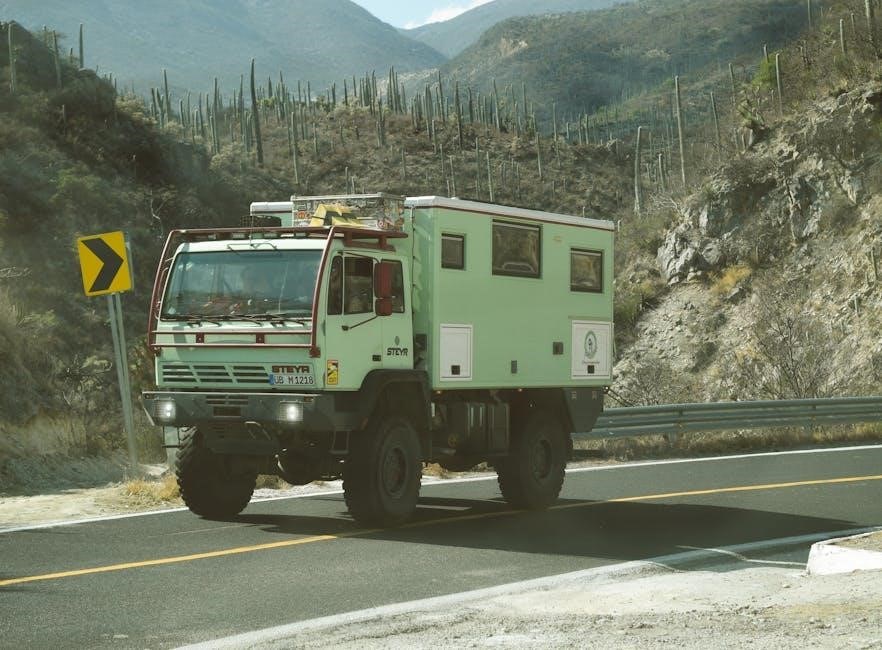
Ensuring your cabover truck camper plan is compatible with your vehicle is crucial for safety and functionality. Start by assessing your truck’s make, model, and year to determine its payload capacity and axle rating. These factors will guide the selection of a camper that fits within your truck’s limitations. Measure the bed length and width to ensure the camper’s dimensions match perfectly. Additionally, consider the truck’s suspension and axle strength, as they must support the camper’s weight. Proper alignment and fitment are essential to maintain handling and prevent damage. Always refer to the manufacturer’s specifications and consult experts if unsure. A well-matched camper and truck combination ensures a stable and enjoyable camping experience.
Budget Considerations
When planning a cabover truck camper, budget considerations are essential to ensure the project remains feasible and affordable. Start by estimating the total cost, including materials, tools, and any professional assistance. Compare prices for lumber, insulation, and hardware to find cost-effective options without compromising quality. Consider whether purchasing pre-made components or building from scratch aligns better with your finances. Additionally, account for ongoing expenses like maintenance, insurance, and potential upgrades. Setting a realistic budget helps avoid overspending and ensures the camper meets your needs without financial strain. Prioritize essential features and cut back on luxuries to stay within your means.
Space and Lifestyle Needs
When selecting cabover truck camper plans, it’s crucial to consider your space and lifestyle needs. Assess how much interior room you require for comfort, including sleeping quarters, storage, and functional areas like a kitchenette or bathroom. If you travel alone or with a small group, a compact design may suffice, but larger families or those needing more amenities will require more space. Evaluate your lifestyle—whether you need a dedicated dining area, workspaces, or outdoor access points. Consider the height and floorplan to ensure ease of movement and accessibility. Additionally, think about optional features like roof vents, windows, or slide-outs to enhance ventilation and natural light. Balancing practicality with personal preferences ensures your camper meets your unique needs.
Materials and Tools Required
Building a cabover truck camper involves materials like aluminum, steel, plywood, and insulation. Essential tools include drills, saws, wrenches, rivet guns, and measuring tools for precise assembly.
Essential Materials
Building a cabover truck camper requires a variety of materials to ensure durability and functionality. Key components include lightweight yet sturdy metals like aluminum or steel for the frame, plywood or composite materials for walls and flooring, and insulation to regulate temperature. Exterior materials such as fiberglass, aluminum sheeting, or vinyl are used for weatherproofing. Windows, doors, and roofing materials like EPDM rubber or asphalt are also essential. Interior finishes may include wood paneling, laminates, or upholstery for comfort. Adhesives, sealants, and fasteners are critical for assembly. Additionally, electrical wiring, plumbing supplies, and propane systems are necessary for modern amenities. Choosing high-quality materials ensures the camper is both reliable and long-lasting.
Essential Tools
Building a cabover truck camper requires a set of essential tools to ensure a successful and professional build. Basic power tools include drills, impact wrenches, and circular saws for cutting and fastening. Hand tools like screwdrivers, pliers, and wrenches are indispensable for detailed work. A tape measure, square, and level are critical for precise measurements and alignment. Cutting tools, such as jigsaws and utility knives, are necessary for trimming materials. Fastening tools, including rivet guns and bolt cutters, help secure components. Safety gear like safety glasses and a first aid kit are must-haves. Specialized tools, such as a roofing torch or sealant applicator, may be needed for specific tasks. Having the right tools ensures efficiency and quality in your camper build.
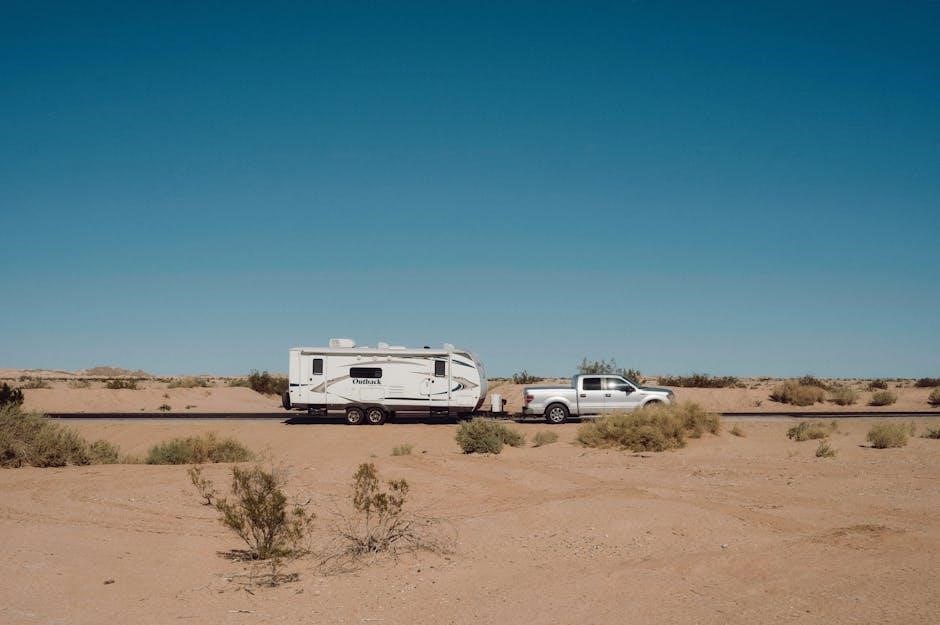
DIY Guide to Building a Cabover Truck Camper
This comprehensive guide provides step-by-step instructions for constructing a cabover truck camper, ensuring a successful build tailored to your needs and skill level.
Preparing the Truck Bed
Preparing the truck bed is the first critical step in building a cabover truck camper. Start by thoroughly cleaning the bed to remove dirt, rust, or debris. Inspect for any damage or wear and ensure the bed is structurally sound. Measure the bed dimensions to confirm compatibility with your camper plans. Secure the bed with tie-down points or brackets to stabilize the camper during installation. Apply a protective bed liner or mat to prevent damage from the camper’s weight and movement. Finally, ensure the truck’s suspension is adequate to handle the added load. Proper preparation ensures a secure and even base for your camper, following the detailed instructions in your cabover truck camper plans PDF.
Assembling the Camper Structure
Assembling the camper structure begins with framing, using durable materials like aluminum or steel for the skeleton. Follow your cabover truck camper plans PDF to cut and weld the frame, ensuring precise measurements for a snug fit on the truck bed. Next, attach the walls and roof panels, securing them with screws or rivets; Install windows and doors, sealing gaps with weatherproofing materials. Use a level to ensure the structure is square and plumb. Once assembled, double-check all connections and reinforce weak points. Finally, sand and paint the exterior for protection and aesthetics. Proper assembly ensures a sturdy, weather-tight camper that meets your design specifications.
Installing Electrical and Plumbing Systems
Installing electrical and plumbing systems requires careful planning to ensure functionality and safety. Start by mapping out the electrical layout, including wiring for lights, outlets, and appliances. Use marine-grade materials to prevent water damage. Install a battery and solar panel if off-grid capability is desired. For plumbing, connect a freshwater tank to a water pump, then link it to sinks, showers, and toilets. Use PEX tubing for flexibility and durability. Properly seal all connections to avoid leaks. Test both systems thoroughly before finalizing. Ensure compliance with safety standards, such as proper ventilation for propane systems. A well-installed electrical and plumbing setup enhances comfort and reliability in your cabover truck camper.
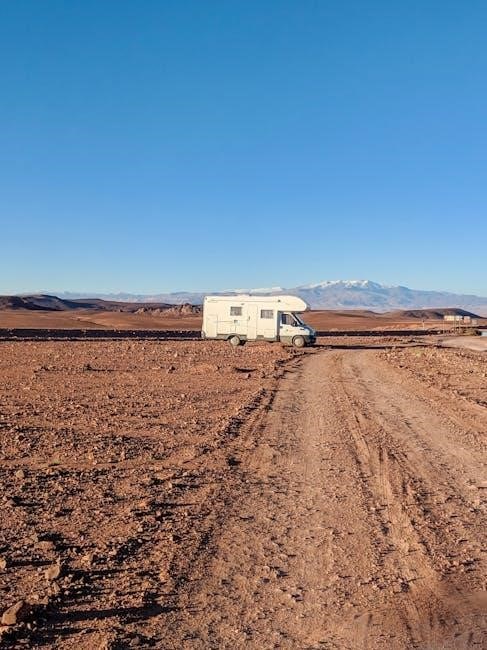
Safety and Regulatory Compliance
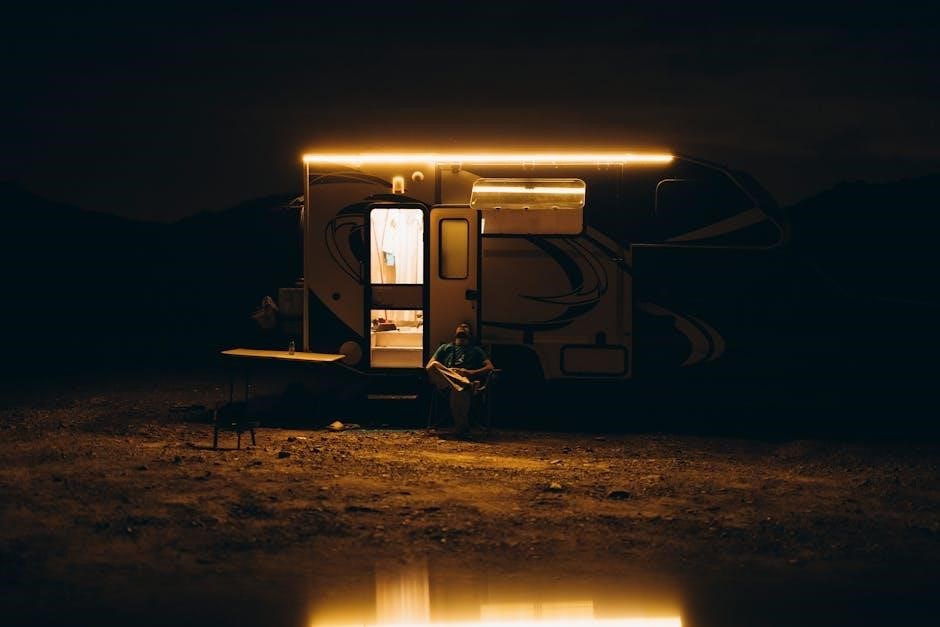
Ensure your cabover truck camper meets local safety laws and weight limits. Proper installation of electrical and plumbing systems is crucial for safe operation and legal compliance.
Weight and Load Restrictions
Understanding weight and load restrictions is critical when building a cabover truck camper. Exceeding your truck’s Gross Vehicle Weight Rating (GVWR) can lead to safety hazards and legal issues. Always consider the camper’s dry weight, cargo, and passengers to ensure compliance. The camper’s design should align with your truck’s axle capacity and payload limits. Using lightweight materials, like aluminum framing and composite panels, can help reduce overall weight. Proper distribution of weight is equally important to maintain balance and stability on the road. Consult your truck’s manual and local regulations to avoid overloading, as this can compromise both safety and legal compliance; Planning carefully ensures a safe and enjoyable camping experience.
Legal and Safety Regulations
When building a cabover truck camper, adhering to legal and safety regulations is essential. Ensure your camper meets local building codes and safety standards, such as those set by the Department of Transportation (DOT) and the Recreation Vehicle Industry Association (RVIA). Properly install safety features like brakes, lighting, and emergency exits. Regular inspections are crucial to maintain compliance and ensure reliability. Always follow weight and load restrictions to avoid legal penalties and safety risks. Familiarize yourself with state-specific regulations regarding camper dimensions, axle weights, and towing requirements. Compliance not only ensures legal adherence but also enhances safety for occupants and other road users. Proper documentation and certifications may be required for registration and insurance purposes. Stay informed about updates to regulations to maintain full compliance throughout your camper’s use.

Design and Customization
Design and customization play a crucial role in creating a functional and personalized cabover truck camper. Tailor layouts, materials, and features to suit your lifestyle and preferences effectively.
Interior Design Options
Interior design options for cabover truck campers focus on maximizing space and comfort. Choose from layouts featuring compact kitchens, convertible dinettes, and overhead bunks. Incorporate lightweight, durable materials like aluminum framing and composite panels for structural integrity. Opt for modular furniture to save space, such as foldable tables or murphy beds. Consider adding amenities like mini-fridges, portable stoves, and wet baths for convenience. Lighting and color schemes can enhance the ambiance, with options for LED lighting and neutral tones. Storage solutions, such as under-bed compartments and overhead cabinets, keep belongings organized. Customize interiors to reflect personal style, ensuring functionality meets lifestyle needs for both short and long-term adventures.
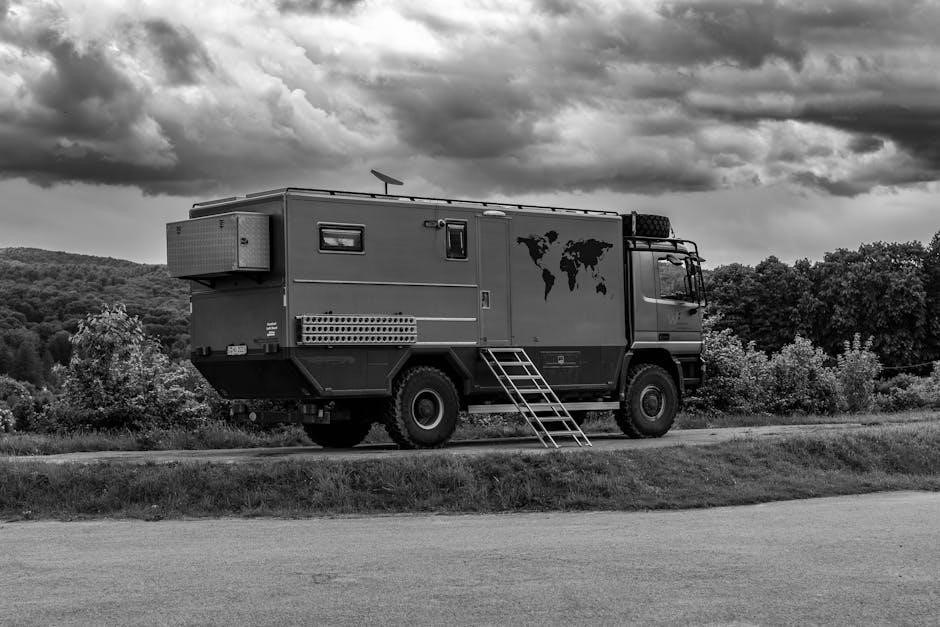
Storage Solutions
Effective storage solutions are crucial for maximizing space in cabover truck campers. Utilize under-bed compartments, overhead cabinets, and sliding drawers to keep essentials organized. Install shelves or nets on walls to store items like tools, clothes, or accessories. Consider adding a rear storage trunk or external compartments for bulky gear. Multi-functional furniture, such as a dinette with built-in storage, can help minimize clutter. Vertical space is key—use stackable containers or adjustable shelves to optimize corner areas. Secure items with tie-downs or latches to prevent shifting during travel. Customizable storage systems, like modular bins or drawer dividers, ensure everything has its place, enhancing comfort and accessibility on the road.

Popular Models and Compatibility
Popular cabover truck camper models include the Lance 650 and Adventurer 80SK, compatible with Ford F-150, Chevrolet Silverado, and RAM 1500. Ensure your truck bed size and weight capacity match the camper specifications for a secure fit.
Compatible Truck Models
When selecting a cabover truck camper, compatibility with your vehicle is crucial. Popular models like the Ford F-150, Chevrolet Silverado, and RAM 1500 are well-suited for cabover campers due to their sturdy frames and ample bed space. Toyota Tundra and GMC Sierra are also excellent choices, offering the necessary payload capacity. Ensure your truck has the appropriate bed length and wheelbase to accommodate the camper’s dimensions. Short-bed trucks may require specific camper models designed for compact spaces. Always verify the weight ratings and axle capacity of your truck to avoid overloading. Matching the camper to your truck’s specifications ensures safety, stability, and optimal performance on the road.
Popular Camper Models
Several camper models are widely recognized for their compatibility and functionality with cabover truck setups. The Lance 650 is a top choice, offering a lightweight design and low profile, ideal for smaller trucks. The Advent AX1150 is another favorite, known for its compact size and amenities like a bathroom and kitchenette. The Bigfoot 1500 series stands out for its durability and spacious interior, catering to both short and long-bed trucks. These models are praised for their aerodynamic designs, which reduce wind resistance and improve fuel efficiency. Additionally, they often feature insulated walls and modern interiors, ensuring comfort in various climates. Their popularity stems from their balance of practicality and luxury, making them versatile options for adventurers seeking comfort on the go.
Modern Trends in Cabover Truck Camper Design
Current designs emphasize lightweight materials, modular construction, and solar integration for off-grid adventures. Smart technology and eco-friendly features like composting toilets and energy-efficient appliances are gaining traction, enhancing sustainability and comfort.
Comfort and Efficiency Features
Modern cabover truck camper designs prioritize comfort and efficiency, incorporating features like advanced insulation for temperature control and noise reduction. High-efficiency heating and cooling systems ensure year-round comfort, while renewable energy integration, such as solar panels, enhances off-grid capabilities. Water conservation systems, including low-flow fixtures, optimize resource usage. Spacious layouts with ergonomic interiors and multi-functional furniture maximize livability. Advanced ventilation systems improve air quality, and smart storage solutions keep belongings organized. These innovations cater to adventurers seeking a balance between luxury and practicality, ensuring a cozy yet efficient living space on the go.
Lightweight and Modular Construction
Modern cabover truck camper designs emphasize lightweight and modular construction to enhance portability and adaptability. By using materials like aluminum, fiberglass, and advanced composites, campers achieve significant weight reduction without compromising structural integrity. Modular designs allow owners to customize layouts, adding or removing sections based on specific needs, such as sleeping quarters, kitchenettes, or storage compartments. This approach not only improves fuel efficiency but also enables easier towing and maneuverability. Modular construction also simplifies maintenance and upgrades, as individual components can be serviced or replaced independently. These innovations make cabover truck campers more versatile and practical for a wide range of camping and travel scenarios, catering to both casual and full-time adventurers.

Common Mistakes to Avoid
- Overloading the camper beyond truck capacity.
- Ignoring proper weight distribution and balance.
- Neglecting to measure the truck bed accurately.
- Skipping essential reinforcements for structural support.
- Not planning for adequate ventilation and insulation.
- Rushing the build without proper planning.
Structural Integrity
Ensuring structural integrity is critical when building a cabover truck camper. A weak frame or improper construction can lead to safety hazards and premature wear. Always use high-quality materials, such as durable lumber and sturdy fasteners, to support the camper’s weight. Properly secure the camper to the truck bed using reinforced attachment points to avoid shifting during transit. Neglecting to reinforce the truck’s frame or camper structure can result in damage or collapse. Regular inspections and maintenance are essential to identify and address potential weaknesses. A well-built camper ensures stability, safety, and long-term durability for your adventures.
Budget and Time Management
Effective budget and time management are crucial when undertaking a cabover truck camper project. Start by setting a realistic budget, accounting for materials, tools, and potential unexpected costs. Allocate funds prioritizing essential components over luxury features. Create a detailed timeline to avoid delays, breaking the project into manageable phases. Research and compare material prices to optimize spending without compromising quality. Utilize free or affordable plans to minimize costs. Regularly track expenses and progress to stay on target. Tools like spreadsheets can help monitor finances and deadlines. Plan for contingencies to handle unforeseen issues. By organizing resources and time wisely, you ensure a successful and stress-free project completion.
Building a cabover truck camper is a rewarding project that combines creativity, practicality, and adventure. With proper planning and execution, you can create a custom camper that meets your needs and enhances your travel experiences. By following detailed plans and considering factors like budget, space, and safety, you can achieve a functional and comfortable living space on wheels. Remember to stay organized, adhere to safety guidelines, and enjoy the process of bringing your vision to life. Whether for weekend getaways or extended trips, a well-designed cabover truck camper offers freedom and convenience. Happy building, and enjoy the journey ahead!
